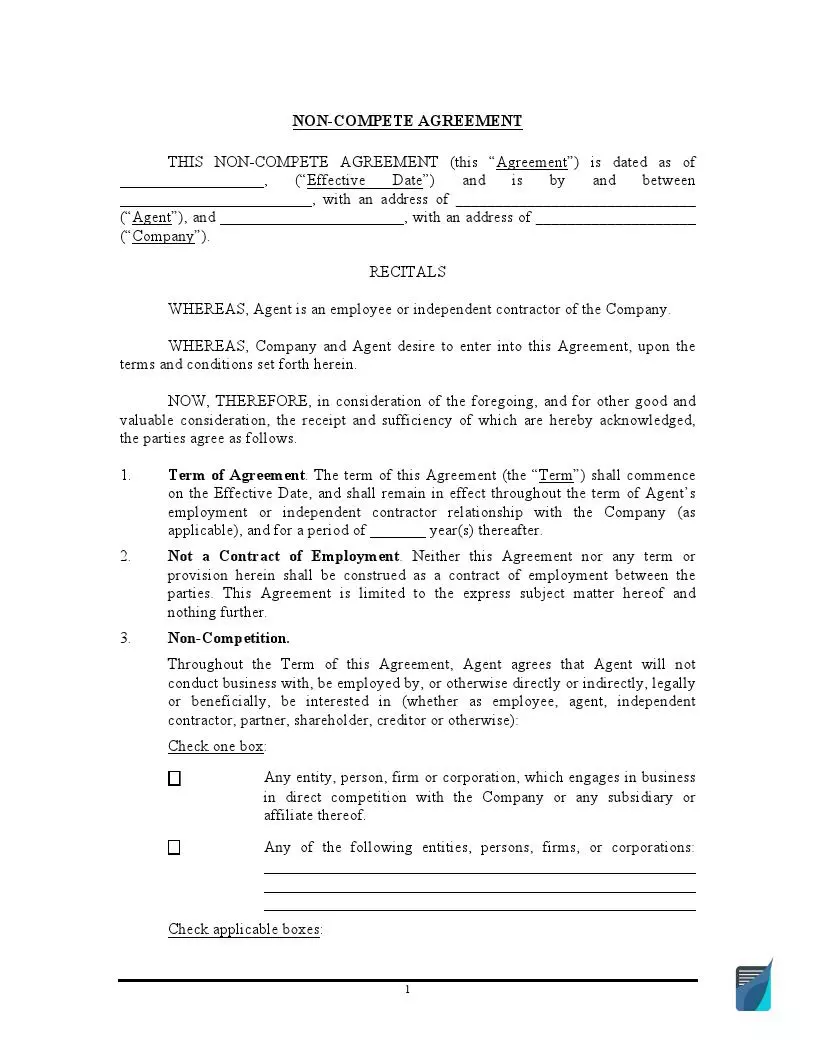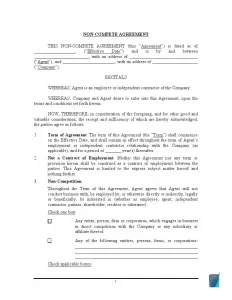Non-compete Agreement Template
A non-compete agreement is a document that prevents an individual or entity from competing with another party. The most common use of a non-compete agreement is when hiring a new employee.
All employees are exposed to specific confidential information depending on their responsibilities within the company. A non-compete agreement prevents the party from using this information against the company they will be working for if they decide to create a similar business or be hired by the competing company. More specifically, a non-compete agreement can prevent an employee from working in the same field for a certain amount of time, or possibly even indefinitely, due to gaining classified information during their employment.

Build Your Document
Answer a few simple questions to make your document in minutes
Save and Print
Save progress and finish on any device, download and print anytime
Sign and Use
Your valid, lawyer-approved document is ready
- Alabama
- Alaska
- Arizona
- Arkansas
- California
- Colorado
- Connecticut
- Delaware
- Florida
- Georgia
- Hawaii
- Idaho
- Illinois
- Indiana
- Iowa
- Kansas
- Kentucky
- Louisiana
- Maine
- Maryland
- Massachusetts
- Michigan
- Minnesota
- Mississippi
- Missouri
- Montana
- Nebraska
- Nevada
- New Hampshire
- New Jersey
- New Mexico
- New York
- North Carolina
- North Dakota
- Ohio
- Oklahoma
- Oregon
- Pennsylvania
- Rhode Island
- South Carolina
- South Dakota
- Tennessee
- Texas
- Utah
- Vermont
- Virginia
- Washington
- West Virginia
- Wisconsin
- Wyoming
- Types of Employees That a Non-Compete Agreement Can Be Used On
- Do Non-Compete Agreements Have Legal Force?
- Where Are Non-Compete Agreements Used?
- Things to Consider When Creating a Non-Compete Agreement
- Non-Compete Agreement Laws by State
- How to Void a Non-compete Restriction?
- How to Fill Out a Non-compete Agreement
Types of Employees That a Non-Compete Agreement Can Be Used On
Independent Contractor
An independent contractor non-compete agreement is established between a contractor and a business. The latter might want to sign the agreement that would prevent the contractor from competing with the other party for the duration of the business relationship with this company and for a specified time after the contractor has left. Simply put, this means that an independent contractor cannot work for another competing company in the same field.
Employee
In this case, an employee non-compete agreement acts as a safeguard for the company by preventing the new employee from using the trade secrets or other business-protected information gained during employment against the company, after being hired at a new workplace, or deciding to work on their own.
Release agreement
It is a separate document that waives the original agreement. This allows a person or persons in a non-compete agreement to work for a competitor, start a new business, or even to work independently without any of the previous restrictions.
Do Non-Compete Agreements Have Legal Force?
Non-compete agreements are not legally binding in all states as laws regarding this type of document are not governed on the federal level and are state-specific. That is why a non-compete agreement is referred to differently in different states. Generally, they can be divided into 4 categories.
Non-compete agreements
It is the most general agreement and it has the employee’s consent to not working for competing companies or starting a business in the same industry as their former employer.
Non-disclosure agreements
Such a contract prohibits a person from sharing information that might be referred to as confidential, for instance the company’s systems and schemes, databases, ownership information, etc.
Employee non-solicitation agreements
This type of document is used to get consent from the employee who is about to leave the workplace that they will not entice their former coworkers to join them at a new company.
Customers non-solicitation agreements
In such a contract, there is a statement that a former employee cannot work with customers they dealt with at their former workplace.
Where Are Non-Compete Agreements Used?
Financial industry
Common uses in this field include non-compete agreements with hedge fund managers, asset firms, and other investment-related companies due to key employees potentially taking their ideas somewhere else. These specific employees tend to have widespread financial knowledge which can be used against employers they work or worked for.
Insurance companies
Such a type of company hires an employee to sell or administer insurance-related programs for its clients. This company is presumed to have paid the employee for their work all the while the latter helped the company get the clients.
A non-competition agreement would make it so the employee who left the company cannot go to a competing business or start one on their own, and use the knowledge gained from their previous employment related to the clients.
IT field
Non-compete agreements are a discussed topic in the IT field due to the explosion of the industry in recent years. One quick example of how it can be related to this field is if the employee is a backend developer for an IT company. During employment, this employee is responsible for the development of how the database information interacts with the browser. A non-competing act would protect the original company from the employee using the information gained during employment at a competing company, or if they decided to start a business of their own, for a specified period of time.
A non-compete agreement might vary from industry to industry, so if you want to get a non-compete agreement template that would best reflect your interests, use our online document builder. A non-compete agreement you will get will be easy to download and print which will save you time and effort.
Things to Consider When Creating a Non-Compete Agreement
If you are the one who is going to use a non-compete agreement to secure your business information from being utilized at other competing companies, here are some things to consider:
- Check your local state legislation. Non-compete agreements are not settled on the federal law level. Each state varies on what they consider to be “trade secrets” and what you can or cannot prevent your employee from doing. Therefore, it is important to know your local legislation first.
- Decide which businesses are your competitors. Consider which companies are direct competitors or ones that the employee may leave you for or be recruited to. It is also important to specify that the employee should not be able to work for themselves as well. This must be very specific because a court most likely will not prevent an employee from working on the net, but they may restrict them from working with specific programs or applications.
- Time period. The time period varies wildly depending on the state. Most states would say that a restrictive time period of 5 years is excessive for a non-compete agreement. Generally, a restrictive period of 1 or 2 years would be considered normal to make the employee covenant not to compete.
- Non-solicitation clause. As we have previously mentioned, solicitation is the act of former employees recruiting workers of their previous company to another competing business. The clause is purposed to not allow the leaving workers to do that. The non-solicitation agreement also prevents former employees from using their knowledge of past clients for their own business purposes or at a competing company.
- Signing. Non-compete agreements technically do not require a notarized signature but it is strongly recommended to have a notary present during the finalization of this document. It guarantees that the employee cannot say they never did it in the future. As well as that, a notary acknowledgment removes any ambiguity that could come up during court proceedings.
A free non-compete agreement template is presented on our website. Use a non compete template to make sure you have prepared a proper document that includes all the provisions required by state laws.
Non-Compete Agreement Laws by State
| STATE | General Attitude | STATE LAW |
| Alabama | Courts generally disfavor NCA | Alabama Code, Sections 8-1-190 to 8-1-197 |
| Alaska | Courts generally disfavor NCA | No Statute |
| Arizona | NCA are generally enforceable as long as they are reasonable | Arizona Revised Statutes, Section 23-494 |
| Arkansas | NCA are generally enforceable as long as they are reasonable | Arkansas Annotated Code, Section 4-75-101 |
| California | NCA are not enforceable | California Business and Professions Code, Sections 16600-16607 |
| Colorado | Courts generally disfavor NCA | Colorado Revised Statutes, Section 8-2-113 |
| Connecticut | NCA are generally enforceable as long as they are reasonable | Connecticut Revised Statutes, Chapter 557, Sections 31-50a and 31-50b; and Chapter 370, Section 20-14p |
| Delaware | NCA are generally enforceable as long as they are reasonable | Delaware Code, Title 6, Section 2707 |
| Florida | Courts generally favor NCA | Florida Statutes, Section 542.335 |
| Georgia | NCA are generally enforceable as long as they are reasonable | Georgia Code, Title 13, Chapter 8, Article 4 |
| Hawaii | NCA are generally enforceable as long as they are reasonable | Hawaii Revised Statutes, Sections 480-2 and 480-4 |
| Idaho | NCA are generally enforceable as long as they are reasonable | Idaho Statutes, Sections 44-2701 to 44-2704 |
| Illinois | Courts generally disfavor NCA | Illinois Compiled Statutes, Chapter 820, Sections 90/ and 17/; and Chapter 30, Section 500/ |
| Indiana | NCA are generally enforceable as long as they are reasonable | Indiana Code, Section 25-22.5-5.5-2 |
| Iowa | NCA are generally enforceable as long as they are reasonable | Iowa Code, Section 523H.8 |
| Kansas | NCA are generally enforceable as long as they are reasonable | No Statute |
| Kentucky | NCA are generally enforceable as long as they are reasonable | No Statute |
| Louisiana | Courts generally disfavor NCA | Louisiana Revised Statutes, Sections 23:921 and 37:1448.1 |
| Maine | Courts generally disfavor NCA | Maine Revised Statutes, Title 26, Sections 559-A and 599 |
| Maryland | NCA are generally enforceable as long as they are reasonable | Maryland Senate Bill 328 |
| Massachusetts | Courts generally disfavor NCA | Massachusetts General Laws, Ch. 149, Sec. 24L and 186; Ch. 112, Sec. 12X, 74D, 135C and 129B; and MA Rules of Professional Conduct 5.6 |
| Michigan | Courts generally disfavor NCA | Michigan Compiled Laws, Section 445.774a |
| Minnesota | Courts generally disfavor NCA | No Statute |
| Mississippi | Courts generally disfavor NCA | No Statute |
| Missouri | Courts generally disfavor NCA | Missouri Revised Statutes, Section 431.202 |
| Montana | Courts generally disfavor NCA | Montana Annotated Code, Sections 28-2-703 to 28-2-705 |
| Nebraska | NCA are generally enforceable as long as they are reasonable | No Statute |
| Nevada | NCA are generally enforceable as long as they are reasonable | Nevada Revised Statutes, Sections 613.195 to 613.200 |
| New Hampshire | Courts generally disfavor NCA | New Hampshire Revised Statutes, Sections 275:70, 275:70-a and 329-31-a |
| New Jersey | Courts generally disfavor NCA | No Statute |
| New Mexico | NCA are generally enforceable as long as they are reasonable | New Mexico Annotated Statutes, Sections 24-1I-1 to 24-1I-5 |
| New York | Courts generally disfavor NCA | New York Labor Law, Section 202-K |
| North Carolina | Courts generally disfavor NCA | North Carolina General Statutes, Section 75-4 |
| North Dakota | NCA are not enforceable (with limited exceptions) | North Dakota Century Code, Section 9-08-06 |
| Ohio | NCA are generally enforceable as long as they are reasonable | No Statute |
| Oklahoma | NCA are not enforceable | Oklahoma Statutes, Sections 15-217 to 15-219A |
| Oregon | Courts generally disfavor NCA | Oregon Revised Statutes, Section 653.295 |
| Pennsylvania | Courts generally disfavor NCA | No Statute |
| Rhode Island | Courts generally disfavor NCA | Rhode Island General Laws, Section 5-37-33; and Chapter 28-59 |
| South Carolina | Courts generally disfavor NCA | No Statute |
| South Dakota | NCA are generally enforceable as long as they are reasonable | South Dakota Codified Laws, Sections 53-9-8 to 53-9-12 |
| Tennessee | Courts generally disfavor NCA | Tennessee Code Annotated, Section 63-1-148 |
| Texas | Courts generally disfavor NCA | Texas Statutes, Business and Commerce Code, Sections 15.50 to 15.52 |
| Utah | Utah generally favors protecting company’s interests, but disfavors preventing competition | Utah Code, Sections 34-51-101 to 34-51-301 |
| Vermont | NCA are generally enforceable as long as they are reasonable | Vermont Statutes, Title 26, Section 281 |
| Virginia | Courts generally disfavor NCA | No Statute |
| Washington | Courts generally disfavor NCA | Washington Revised Code, Section 49.44.190; and Chapter 49.62 |
| West Virginia | NCA are generally enforceable as long as they are reasonable | West Virginia Code, Sections 47-11E-1 to 47-11E-5 |
| Wisconsin | Courts generally disfavor NCA | Wisconsin Statutes and Annotations, Section 103.465 |
| Wyoming | Courts generally disfavor NCA | No Statute |
How to Void a Non-compete Restriction?
In a non-compete agreement, there might be a clause about the termination of the agreement under certain circumstances. However, an employee should remember that once they are signing a non-compete agreement, and it adheres to all legal requirements, they are bound to follow its provisions.
If an employee feels that they do not agree with certain provisions in the non-compete agreement, before contesting the agreement in court, they can first talk to the employer about the vagueness of the contract and possible ways to solve it. If negotiation with the employer is not successful, they can challenge the non-compete agreement in court. Here are the most common reasons for turning to the court:
- If a non-compete agreement includes a long timeframe, for instance, more than 5 years (which is not approved by most states).
- If a non-compete agreement is applied to the area where the employer doesn’t provide their services or if the entire country is chosen as the location.
- If the non-compete agreement involves industries that cannot be considered competing in relation to the employer.
- If the employee’s life or family is threatened by a non-compete agreement, for example, one of the family members is sick and the employee has to support the family.
- If a non-compete agreement is in any way discriminatory, for instance, is required only for males or for people aged 30 or younger.

How to Fill Out a Non-compete Agreement
Step 1
Non-compete agreements usually start with the company name, that is, the name of the employer, and the name of the employee. Along with that, it should have the date of the non-compete agreement.
Step 2
After the employer and company name, the agreement should include the terms the employer and employee consent to. For example, they might agree that for the duration of the non-compete agreement, the employee will not work for or establish a competing business. Alternatively, a non-compete agreement might have a provision that would prevent the employee from enticing the customers of the company to change the service provider.
A proper non-compete agreement template should also state what geographical area this agreement applies to and for what time it is put in force.
Step 3
The next section in the agreement should be called “Employee acknowledgments”. It should include the wording that the employee had the possibility to negotiate the agreement with the employer and could use legal help before signing the document. The employee should also agree that the restrictions outlined in the non-compete agreement template do not constitute any sort of threat to them.
Step 4
The agreement might also offer the employee to void it by paying a certain fee to the company. However, offering this option is entirely up to the employer.
Step 5
In the section “Applicable law”, write down that states which laws should be applied to the non-compete agreement.
Step 6
The last step is to sign the document. For non-compete agreements to become valid, both the employer and employee should leave their signatures. If the employer cannot sign the document, their representative’s signature is needed.
